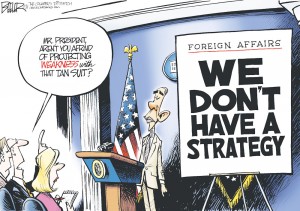
The man, whose face is covered, addresses the U.S. government. “Just as your missiles continue to strike our people, our knife will continue to strike the necks of your people.” The administration has since confirmed the video’s authenticity; Sotloff, 31, was beheaded.
At a press conference that followed, President Obama expressed his condolences to Sotloff’s family and firmly warned ISIS that there would be consequences.
“We will not be intimidated,” the President said. “Those who make the mistake of harming Americans will learn that we will not forget, and that our reach is long and that justice will be served.”
Back in August, a remarkably similar video surfaced in which another journalist, James Foley, was also beheaded. The Islamic militant in this video also denounced airstrikes ordered by the President and warned countries in alliance with America to “back off.”
Should we back off? Hassan Farah, a political science and optometry major says we should. He shared stories about political unrest in his home country of Somalia and expressed his concerns about America’s intervening in foreign affairs.
“Let people solve their own problems,” Farah says. “You can’t solve someone’s problems by simply going places and bombing them.”
Some, though, argue that the situation in Iraq has improved with American military action. Secretary of Defense Chuck Hagel spoke to reporters in August about how critical the near hundred airstrikes have been in aiding innocent civilians. Hagel said that America’s efforts have “helped Iraqi and Kurdish forces blunt ISIL’s advances around Irbil and helped the Iraqis retake and hold Mosul Dam.”
According to Ferris political science professor Christine Bailey, the complication is that ISIS is not supported by a government. “They do not represent a country,” Bailey said. “They do not have a government or readily identifiable leader.”
Bailey said that this ambiguity is what complicates the matter. “Syria and Iraq are sovereign nations that are independent of U.S. rule. The question is, do we have the right to bomb a country that has something living in it that we don’t agree with?” For updates on American involvement in the middle-east, visit the White House Blog at whitehouse.gov/blog.
